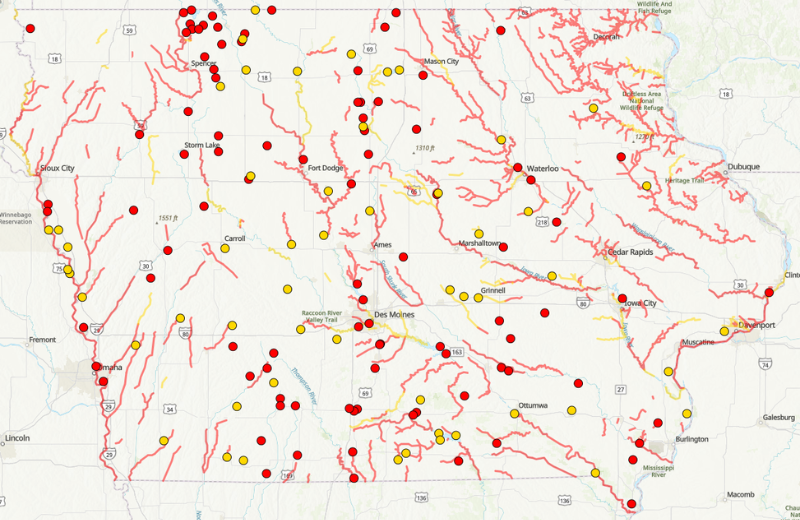IEC Writes Open Letter to DNR, Calling for More Water Monitoring
posted
on Thursday, July 18, 2024
in
Water and Land News
This morning, the Iowa Environmental Council sent the following letter to the Iowa Department of Natural Resources (DNR) Director Kayla Lyon. This letter is a formal request to the DNR to use ambient surface and groundwater quality testing funds to be broadened to include surface waters, public drinking water wells, and privately-owned wells. This change would help the DNR analyze the impacts of flooding on local water quality, citing the recent floods Northwestern Iowa.
July 18, 2024
Kayla Lyon
Iowa Department of Natural Resources
6200 Park Ave
Des Moines, IA 50321
Email: Kayla.Lyon@dnr.iowa.gov
RE: Water Quality Testing
Dear Ms. Lyon:
The Iowa Environmental Council (IEC) requests that the Iowa Department of Natural Resources (DNR) use unspent ambient surface and groundwater quality testing funds to assess the quality of Iowa’s waters following the unprecedented flooding in Northwest Iowa. In light of the potential impacts of flooding on water quality and the state’s limited testing to date, we ask DNR to use the funding it has available to expand its testing on surface waters, public drinking water wells, and privately-owned wells.
Iowa DNR has reported that it has significant unused funding appropriated to conduct ambient water quality monitoring. The most recent report from March 31 showed $2,057,870 remaining for the final quarter of the fiscal year to conduct surface and groundwater quality monitoring. Some types of monitoring have been prevented by the severe flooding in Northwest Iowa in recent months, but the unspent appropriations go far beyond anything resulting from this year’s flooding.1
| Funding Source Name | Water Quality Monitoring |
| Previous Carryforward | $807,687 |
| FY24 Receipts | $2,995,000 |
| Total Revenue | $3,762,687 |
| Expenditures | $1,704,817 |
| Balance Remaining for Q4 | $2,057,870 |
Table 1: Unspent funding for ambient water quality monitoring. From “FY 24 Department of Natural Resources Quarterly Expenditure Report,” March 31, 2024. Available at https://www.legis.iowa.gov/docs/publications/DF/1454077.pdf.
DNR carried forward a quarter of its water quality monitoring budget into this fiscal year. Going into the last quarter of the fiscal year, DNR has used less than 60 percent of its FY2024 appropriations for the year. It has nearly 70 percent of its appropriation remaining. Given DNR’s flat budget for water quality monitoring over the past two decades2 and the significant water quality concerns in the state, DNR’s failure to provide a better evaluation of the state of our waters is unacceptable. The department must do better.
The severe flooding this June has created what has been called a “fecal soup” in the media,3 and likely also contains a cocktail of pesticides and other chemicals that risk the health of Iowans who may come in contact with them. Floodwaters have entered peoples’ homes and exposed them to any contaminants in the water, and drinking water sources were contaminated.
We request DNR use the unused funding to conduct additional testing of surface and groundwater for bacteria and nitrate, particularly in areas affected by the flooding, commencing immediately. This approach will help Iowans whose local waters may have been contaminated by floodwaters and will also help the department, community leaders, and the public understand the impacts of flooding on water quality.
Iowans already face significant threats to groundwater quality pollution. DNR’s existing monitoring shows that the majority of assessed rivers, streams, lakes, and reservoirs are not meeting water quality standards.4 The 577 waterbodies not meeting standards exclude hundreds of additional waterbodies that have not been assessed or lack sufficient information.

Figure 1: Map of Draft 2024 Impaired Waters (Class 4 and Class 5). Available at https://programs.iowadnr.gov/adbnet/Assessments/Summary/2024/Impaired/Map.
DNR should utilize its resources during this critical time to test the state’s waters, investigate the impacts of flooding on water quality, and demonstrate the ongoing need for appropriations for water quality monitoring. The department must use the funding from the legislature to inform Iowans about their water quality and the risks they may face from water contamination.
Sincerely,
/s/ Michael R. Schmidt
Michael R. Schmidt Staff Attorney
Iowa Environmental Council
/s/ Alicia Vasto
Alicia Vasto
Water Program Director
Iowa Environmental Council
Citations:
[1] “FY 24 Department of Natural Resources Quarterly Expenditure Report,” Required by 2023 Iowa Acts ch. 109, available at https://www.legis.iowa.gov/docs/publications/DF/1454077.pdf (at line 13).
[2] DNR has received the exact same appropriation for water quality monitoring expenses since fiscal year 2004.
[3] Jacobo, Julia. “Fecal Soup Could Be Lurking in Iowa Floodwaters, Health Experts Warn.” ABC News, 28 June 2024, https://abcnews.go.com/US/fecal-soup-lurking-iowa-floodwaters-health-experts-warn/story?id=111477065.
[4] “2024 305(b) Assessment Summary,” Iowa DNR, available at https://programs.iowadnr.gov/adbnet/Assessments/Summary/2024 (last visited July 15, 2024).